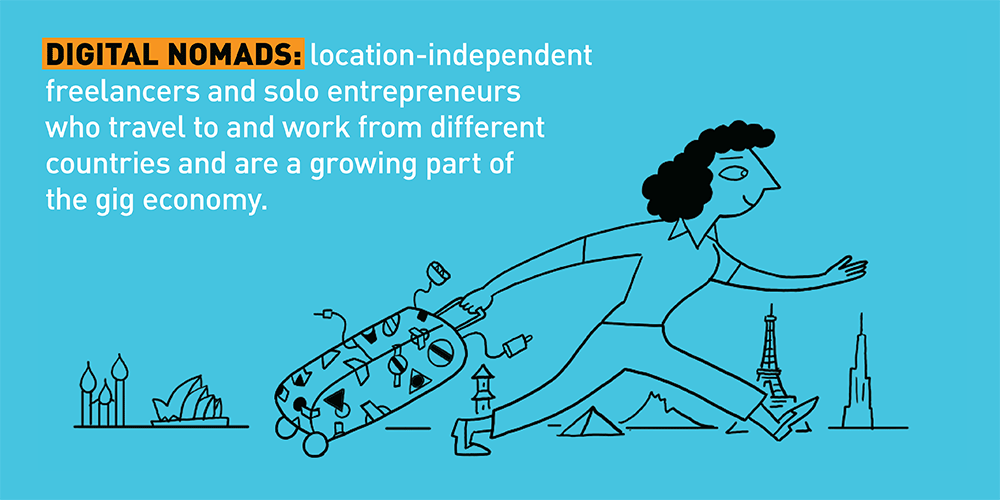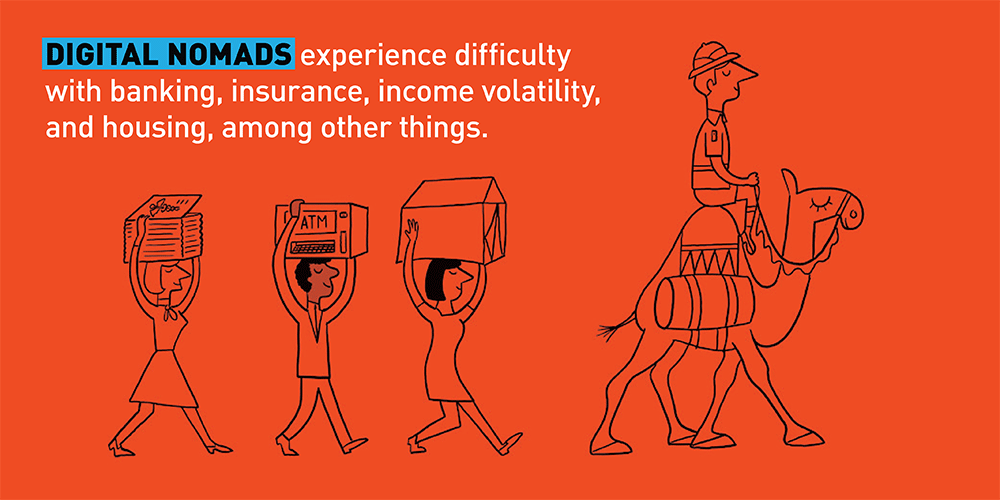Designing a future for the untethered workforce
The gig economy — and the growing group of digital nomads within it — requires a wider variety of new products and services than businesses and governments are currently prepared to deliver. See also “Digital Nomads."
Nour Tohmé is constantly on the move. Working as an illustrator with remote clients, she’s able to live in a new location every few days or weeks. Two years and 40 countries later, she has no place she calls home, and she finds her work ideally suited to her nomadic lifestyle. But certain things are difficult: finding budget-friendly accommodations, coworking spaces, reliable Wi-Fi, healthy food and exercise options, and a way to connect with local communities and other location-independent workers in the cities she travels to.
Workers like Tohmé aren’t the only ones finding freedom, but also challenges, in the ability to do business from anywhere. Christopher Pruijsen, CEO and cofounder of Homies.io, a software design and development agency, shut down his company’s office in Austin, Tex., and switched to an entirely remote workforce. Core team members are now spread across North America and Europe, with contractors in many more countries. He points out the cost advantages of having a distributed, virtual team, and says he believes that many highly skilled workers are attracted by the flexibility offered by gig work. But he also says it can be difficult to find remote talent, manage effectively, build culture and a sense of shared mission, and deal with cross-border legal issues.



Tohmé and Pruijsen are two faces of an evolving reality in which digital nomads — location-independent freelancers and solo entrepreneurs who travel to and work from different countries — are becoming an increasingly prevalent factor in the workforce. Their stories offer a glimpse into the future of work and the global race for talent. Add to their perspectives the news in February 2018 that the Estonian government is launching a “digital nomad visa” to make it easier for such professionals to work and live in the country, and note the growing number of startups devoted to the nomadic and remote talent pool, and it becomes clear that changes in the way people work require a broad array of new products, services, and regulations. Governments and businesses that are not yet responding are missing enormous opportunities and putting themselves at risk of falling behind.
The Future Is Flexible
Digital nomads are one facet of the larger gig economy, which also includes traditional freelancers, remote workers and teams, contingent workers, and side hustlers. A February 2018 study by survey firm Inavero on behalf of Upwork, one of the world’s largest global freelancing platforms, found that the U.S. hiring managers included in the survey expect a 168 percent increase in work done by flexible talent within 10 years. And Mary Meeker, an expert in new technologies and a partner in venture capital firm Kleiner Perkins Caufield & Byers, said in her 2018 report that “freelance work is growing three times faster than the growth of the total workforce.”
Although gig work is not new, factors that are causing this boom are. Emerging tools and platforms, including gig-work sites such as Upwork, Toptal, and TaskRabbit, are enabling remote work. Technology is creating job redundancies and the perception among employees of less security in traditional jobs. And changing values are emphasizing autonomy and quality of life over security and job loyalty.
Things are shifting from the employer’s perspective, too. In its 2017 CEO Survey (pdf), PwC found that 77 percent of CEOs surveyed, from 79 different countries, believed a lack of access to talent with the right skills was the biggest threat to their business. Upwork’s report contained similar findings; 52 percent of U.S. hiring managers surveyed said talent shortage was the top driver leading them to adopt flexible work models, and 90 percent of companies in the survey said they were open to hiring freelancers. Making location-independent work available widens the talent pool for hiring managers, but it also means it’s no longer realistic to assume the best people will stay in a single company or country. The biggest competitor for a company’s talent may be Thailand, not Apple.
“There are two kinds of countries and businesses: those that think that talent will just come to them, and those that understand that attracting talent is the key to the future and are making plans for getting those people in,” says Karoli Hindriks, a close collaborator with the Estonian government on its digital nomad visa and the CEO of global job platform Jobbatical.
Estonia’s new visa, which will allow digital nomads to live and work in the country for up to a year, is especially interesting and important because Estonia is one of the few countries in the world that is actively planning for the evolving reality of work. By creating a frictionless opportunity for nomadic workers, Estonia is setting itself up to be an aspirational destination for highly skilled professionals.
Governments and businesses that are not yet responding are missing enormous opportunities and putting themselves at risk of falling behind.
Other countries are looking at the issue of benefits for gig workers and recognizing that their current frameworks and regulations are inadequate to deal with the contingencies of the gig economy. Although benefits such as health and disability insurance and sick leave have traditionally been synonymous with full-time employment, there is greater and greater demand from varying quarters for such benefits to be extended to the gig economy.
The demographics of flexible work are worth noting, too. Although millennials have been the face of the digital nomad movement, the trend is now reaching beyond millennials and generation Z to include generation X and baby boomers. In a 2018 report (pdf) by accounting firm Freshbooks on self-employment in the United States, 49 percent of freelancers surveyed were over age 50, and 61 percent of them expected to freelance after traditional retirement age. Some governments and businesses are reacting to these trends. Australia’s 2018 federal budget, for example, included a AU$189.7 million “More Choices for a Longer Life” package to fund jobs and training that would help keep older workers employed.
Momentum in venture capital also tells a story about the rise of flexible work. WeWork, a coworking and co-living company, hit a US$20 billion valuation after raising $4.4 billion in August 2017, and Remote Year, a program that enables the self-employed and company employees to work remotely for a year, spending every month in a new country, raised $12 million in October 2016. Freelance platforms are not too far behind. In April 2018, on-demand staffing site Wonolo, which had already raised $7.9 million, raised another $13 million from Sequoia Capital, which cited growth opportunities in the future of work as the reason for its investment.
Bottom line: Whether by choice or by necessity, gig work is here to stay.
Nomads Need New Products and Services
Some entrepreneurs are already responding to the growing gig economy with products and services tailored to flexible work, but there’s still a long way to go. Digital nomads experience difficulty with banking, insurance, cross-border taxation and regulation, technology, agile learning systems and upskilling, accreditation systems, and housing, among other things.
Colleen Poynton, head of product at Hugo Insurance, which provides usage-based liability insurance for drivers, believes many more services are going to be required for the gig economy. She sees opportunity in rethinking some aspects of underwriting, in dynamic loan servicing and collections, and in real-time payments that can help smooth cash flow. “How do you deal with a population that doesn’t know what their next paycheck is going to be?” she asks.
Traditional banks, in particular, are vulnerable to disruption, given the needs of an increasingly untethered, unpredictable workforce. Because of the risk and regulatory frameworks by which banks still operate, many are unable to offer basic services to workers who aren’t full-time employees. Long-standing know-your-customer identity verification processes that include collecting proof of address and salary statements aren’t compatible with a gig worker’s reality, so most either live without many of the benefits offered to full-time employees or turn to fintech services that are now filling the gap.
Viktor Vorski, a resident of the U.K. who has been involved with various forms of freelance and remote work since 1995, says he couldn’t get a euro account, which eliminates the need for exchanging currencies when you know you’ll be making a lot of transactions with euros, when he was moving to Lisbon, Portugal. “If you don’t have a permanent address, it’s like a crime,” he says. Fortunately for him, fintech services such as TransferWise, which can be used to transfer money in 26 currencies, and Revolut, a mobile banking alternative, came to the rescue. If Vorski’s case seems out of the ordinary, Revolut’s numbers say otherwise. The company has picked up 2 million customers since its launch in 2015, and adds 6,000 to 8,000 more each day.
One of the oft-cited grievances of digital nomads, remote workers, and employers with remote teams is what they describe as exorbitant wire transfer fees. Digital nomad Shirah Foy says the first time she used Western Union to transfer money from Lausanne, Switzerland, where she currently lives and works, to pay her credit card bills in the U.S., she paid an $80 fee. “You really feel the pain of that,” she adds. This is where a solution such as TransferWise, with low fees and borderless accounts, might prove to be disruptive. It is one-eighth the cost of a bank transfer. After discovering it, Foy says her fee fell to $4.
Other startups are also taking advantage of legacy banks’ pain points. Berlin-based N26 is leveraging the power of partnerships and a deep understanding of shifting values to offer customer-centric banking experiences. It takes less than eight minutes to set up an account with the mobile-only bank, and customers get access to a variety of financial services, including savings and insurance, through its relationship with companies such as Raisin, a pan-European deposit marketplace, and Allianz, an international insurance and asset management company.
N26 also responds to a particularly sticky problem that freelancers and other self-employed workers face: getting loans. Traditional banks’ know-your-customer requirements make most gig workers ineligible for a loan. But N26 partners with Auxmoney, a peer-to-peer loan marketplace, to provide loans specifically to freelancers and the self-employed. N26 is set to enter the U.S. market this year.
Some traditional banks are responding to the changing nature of work, too. Among them is Groupe BPCE, France’s second-largest bank. It recently partnered with TransferWise, which will enable the bank’s 15 million customers to send money to more than 60 countries for 0.5 percent of the total amount on most currency routes and at the midmarket exchange rate. Meanwhile, BBVA, one of Spain’s biggest banks, has backed Denizen, a startup that emerged out of BBVA’s New Digital Businesses incubator and that offers borderless accounts. These accounts allow customers to receive money in one country and pay it out in another, eliminating international transfer fees and currency exchange rates.
Lack of health insurance also plagues most digital nomads. The insurance industry has almost nothing to offer the gig worker, and traditional insurance is also viewed with suspicion by many nomads who prefer to take the risk of being without insurance rather than pay what they see as exorbitant premiums.
“The current insurance system is terrible for nomads,” says Lars King, a U.S. citizen and digital nomad currently living in São Paulo. He cites prohibitive cost, bureaucracy, and high deductibles as some reasons many nomadic workers prefer to be without insurance. For his own insurance, he uses Liberty HealthShare, a Christian healthcare cost-sharing ministry, in which members’ monthly payments are pooled to cover everyone’s bills. Members pay from $150 to $500 per month, depending on their age and the type of plan, and there are some limitations to coverage, including that you must be healthy to qualify.
World Nomads is another company that offers flexible insurance, allowing travelers to buy insurance that can be claimed from anywhere in the world, even after they’ve left their home country or after they are in need of it. The company has built a bustling online community and has also positioned itself as a proponent of responsible travel, even facilitating microdonations that allow policyholders to fund development projects in the places they might visit.
Some freelance platforms are also adding insurance benefits. Sondre Rasch, the Norwegian founder of freelancing platform Konsus.com, says he was responding to what he saw as a growing and urgent need gap when he cofounded SafetyWing. In partnership with insurance provider Tokio Marine, SafetyWing offers global care coverage for $37 a month. “We wanted a product that was simple [and that] had subscription-like, transparent pricing; worldwide coverage; and home-country coverage,” Rasch says. The latter is a huge issue for many nomads with travel insurance, which does not cover them in their home country. “As a company, our aim is to see if we can remove the psychological toll of financial uncertainty created by the digital nomad lifestyle,” Rasch adds. Although the service covers prescribed medications and hospital visits, it excludes preventive care and preexisting conditions.
Income volatility is another issue that’s especially critical among gig-only workers. Unpredictable earnings often translate into lack of savings and investments. In Upwork’s 2017 Freelancing in America study, 71 percent of freelancers surveyed cited unpredictable income as their top reason for not being able to save. A couple of fintech companies offering automated savings may therefore be a boon for gig workers.
Digit analyzes a user’s spending patterns and withdraws anything over the typical amount spent and puts it in an FDIC-secured savings account. Acorns works on the micro-investing model, rounding up purchases to the nearest dollar and investing the change in exchange-traded funds. Acorns has applied a similar approach to the retirement market, with the launch in early 2018 of Acorns Later, which registered 100,000 new accounts in its first month.
Another pernicious aspect of income volatility can be the costs associated with overdrafts, payday loans, and credit card debt. Companies such as Trezeo and Qwil offer solutions to alleviate the need for costly loans. Trezeo describes itself as an “income-smoothing” service. For a monthly fee, it will determine a user’s average paycheck and deposit any overage into a savings account. If the user receives a lower-than-average paycheck, it will provide an interest-free loan to make up the difference, to be paid back out of future earnings.
Qwil works slightly differently in that it provides instant payment to freelancers who have earned money but have not yet been paid. Qwil advances the payment that is owed, tracks payments with companies, and takes legal action if necessary. The caveat is that the service is limited to companies that sign up with Qwil and grant access to their network of freelancers.
Anindo Ghosh, a Mumbai-based gig worker, thinks insurance should be reimagined to cater to those with unpredictable income: “I would be very happy to have a percentage of my premiums sequestered and paid out to me either when I’m sick or when I’m not working.”
Accommodations for digital nomads are also experiencing an interesting paradigm shift around the world. Airbnb has already challenged the hotel industry with with its offerings, based on the sharing economy, and a new crop of hotel alternatives for nomadic workers is no less significant. From Berlin to San Francisco, communal housing — in the form of revamped hostels and dorms targeting nomadic professionals — is becoming the accommodation of choice of solopreneurs, remote teams, and locals.
In Bangalore, India, two-year-old Construkt hostel has become popular among the “hackpacker” set. Billing itself as an alternative to the business hotel, Construkt is a hybrid co-living, coworking space that caters to digital nomads, visiting entrepreneurs, investors, and traveling creatives. “There is a deep inclination in the millennial startup tribe to flock together, and hence, who you stay with becomes more important than where you stay,” explains Shashikiran Rao, Construkt’s cofounder. “Earlier, businessmen patronized business hotels mainly to meet others of [their] ilk, discover new opportunities, etc. The business hostel is the millennial answer to that.”
Sixty percent of Construkt’s residents are early-stage founders who have no qualms about trading their privacy for bunk beds and shared bathrooms. On any given morning over breakfast, a casual chat with fellow guests can create important opportunities — an introduction to an investor, feedback on product, or partnership with a fellow entrepreneur’s startup. Spontaneous peer-led events, such as Meet the Startups, can offer feedback, advice, and resources. The hostel has done so well that the founders had to mandate a three-month maximum stay, and surge in demand has resulted in a second location and expansion plans across other Indian cities.
Many nomadic workers face issues of loneliness, too, and having to start from scratch in each new city can get exhausting. “I would happily pay for a service that organizes basic things for me,” admits Tohmé. For her, this would include flight reservations; accommodations; and information on coworking cafes, gyms, vegan restaurants, and critical on-the-ground situations, such as whether credit cards are widely accepted or cash is necessary. “I would also love it if it would link me to a local community,” she adds.
Behere, another newcomer in the business accommodations space, is offering these sorts of services in six cities in Southeast Asia and Europe. The company targets women, with customized offerings that include housing, coworking spaces, gym memberships, local SIM cards, and local community managers who can help ease a digital nomad into her new city. To drum up even more business, Behere is also targeting businesses to persuade them to let their employees work remotely, quoting statistics that show that remote work results in increased worker productivity and retention.
Workplace Regulations Need to Change
Beyond needing specialized services and solutions, freelancers and employers in many countries are hamstrung by another problem: workplace regulation. In many countries, even if a freelance platform or a remote employer wants to offer benefits such as insurance and sick leave to its gig workers, current employment classifications penalize any effort to do so by calling these workers full-time employees. This means the employer is obliged to follow the rules for full-time employment, such as setting working hours, which sometimes run counter to the idea and purpose of gig work.
Hindriks says the current employment framework is antithetical to the needs of the future of work. “The rules and frameworks exist for a time when people stayed in one place and in one job all their lives, enjoying the security associated with that. In 2018 and beyond, countries and companies need new approaches and innovative structures if they want to attract and retain the best talent.”
Some politicians are taking action. In January, Washington State Representatives Monica Stonier, Mike Sells, and Gerry Pollet sponsored a bill to create a portable benefits system that would require employers to contribute to organizations that would provide a range of benefits to workers, including healthcare and retirement savings, that could be taken with the worker from job to job.
But others worry that offering more rights to gig workers could actually limit new business models. “While it is important to protect people from exploitation, it is also important that we do not stifle new, and sometimes widely different, business models with unnecessary regulation,” said Craig Laundy, Australia’s minister for small and family business, the workplace and deregulation, after that nation’s Transport Workers Union lobbied for gig-friendly regulations.
The existence of regulations preventing benefits and opportunities from being extended to contingent workers and freelancers has led in some places to accusations of exploitation and unfair practices. In the U.K., a recent government-backed initiative looked at how employment practices need to be updated to reflect changes in modern business models. The Royal Society for the Encouragement of Arts Manufactures and Commerce says there are 1.1 million gig workers in Great Britain, and that the number is rapidly growing. And Prime Minister Theresa May has acknowledged the need to reconsider current regulations. “We recognize the world of work is changing, and we have to make sure we have the right structures in place to reflect those changes, enhancing the U.K.’s position as one of the best places in the world to do business,” she said.
In April 2017, the E.U.’s European Commission published a document, “European Pillars of Social Rights,” that included a proposal aimed at securing greater protections for the gig economy. And in March 2018, the commission recommended that workers with nonstandard employment contracts, as well as the self-employed, should have access to maternity leave, sick leave, disability, and unemployment benefits. According to the commission, about 40 percent of E.U. citizens are in the “irregular” labor market.
This attention to fair practices and regulation is good, but doesn’t adequately address the breadth of change heralded by the shifting culture of work. Government and business reactions are currently incremental and piecemeal, largely confined to debates on in-house versus remote work and how to handle benefits and compensation. We’re just beginning to scratch the surface of gig economy needs. The future of work requires far-reaching reorganization, and those entities that can envision and innovate around these shifts will have an edge over those that wait.
Author profile:
- Suvarchala Narayanan is a digital nomad whose current gigs include technology and business journalism, startup consulting, and doing research and speaking on the future of work. She lives in India and Europe.




